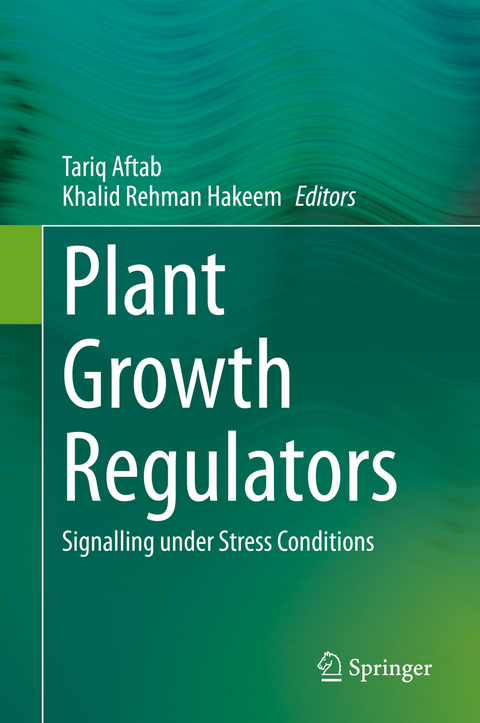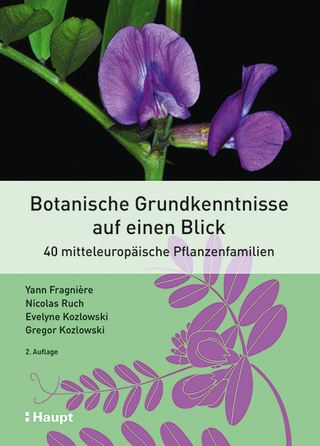
Plant Growth Regulators
Springer International Publishing (Verlag)
978-3-030-61152-1 (ISBN)
Agriculture faces many challenges to fulfil the growing demand for sustainable food production and ensure high-quality nutrition for a rapidly growing population. To guarantee adequate food production, it is necessary to increase the yield per area of arable land. A method for achieving this goal has been the application of growth regulators to modulate plant growth. Plant growth regulators (PGRs) are substances in specific formulations which, when applied to plants or seeds, have the capacity to promote, inhibit, or modify physiological traits, development and/or stress responses. They maintain proper balance between source and sink for enhancing crop yield. PGRs are used to maximize productivity and quality, improve consistency in production, and overcome genetic and abiotic limitations to plant productivity. Suitable PGRs include hormones such as cytokinins and auxins, and hormone-like compounds such as mepiquat chloride and paclobutrazol. The use of PGRs in mainstream agriculture has steadily increased within the last 20 years as their benefits have become better understood by growers. Unfortunately, the growth of the PGR market may be constrained by a lack of innovation at a time when an increase in demand for new products will require steady innovation and discovery of novel, cost-competitive, specific, and effective PGRs.
A plant bio-stimulant is any substance or microorganism applied to plants with the aim to enhance nutrition efficiency, abiotic stress tolerance and/or crop quality traits, regardless of its nutrients content. Apart from traditional PGRs, which are mostly plant hormones, there are a number of substances/molecules such as nitric oxide, methyl jasmonate, brassinosteroids, seaweed extracts, strigolactones, plant growth promoting rhizobacteria etc. which act as PGRs. These novel PGRs or bio-stimulants have been reported to play important roles in stress responses and adaptation. They can protect plants against various stresses, including water deficit, chilling and high temperatures, salinity and flooding.
This book includes chapters ranging from sensing and signalling in plants to translational research. In addition, the cross-talk operative in plants in response to varied signals of biotic and abiotic nature is also presented. Ultimately the objective of this book is to present the current scenario and the future plan of action for the management of stresses through traditional as well as novel PGRs. We believe that this book will initiate and introduce readers to state-of-the-art developments and trends in this field of study.
lt;p>Tariq Aftab received his Ph.D. in the Department of Botany at Aligarh Muslim University, India, and is currently an Assistant Professor there. He is the recipient of a prestigious Leibniz-DAAD fellowship from Germany, Raman Fellowship from the Government of India, and Young Scientist Awards from the State Government of Uttar Pradesh (India) and Government of India. After completing his doctorate, he has worked as Research Fellow at National Bureau of Plant Genetic Resources, New Delhi and as Post-doctorate Fellow at Jamia Hamdard, New Delhi, India. Dr. Aftab also worked as Visiting Scientist at Leibniz Institute of Plant Genetics and Crop Plant Research (IPK), Gatersleben, Germany, and in the Department of Plant Biology, Michigan State University, USA. He is a member of various scientific associations from India and abroad.
He has edited 6 books with with international publishers, including Elsevier Inc., Springer Nature and CRC Press (Taylor & Francis Group), co-authored several book chapters, and published over 50 research papers in peer-reviewed international journals. His research interests include physiological, proteomic, and molecular studies on medicinal and aromatic plants.
Khalid Rehman Hakeem, PhD is Professor at King Abdulaziz University, Jeddah, Saudi Arabia. After completing his doctorate (Botany; specialization in Plant Eco-physiology and Molecular Biology) from Jamia Hamdard, New Delhi, India, in 2011, he worked as a lecturer at the University of Kashmir, Srinagar, for a short period. Later, he joined Universiti Putra Malaysia, Selangor, Malaysia, and worked there as Post Doctorate Fellow in 2012 and Fellow Researcher (Associate Prof.) from 2013 to 2016. Dr. Hakeem has more than 10 years of teaching and research experience in plant eco-physiology, biotechnology and molecular biology, medicinal plant research, plant-microbe-soil interactions as well as in environmental studies. He is the recipient of several fellowships at both national and international levels; also, he has served as the visiting scientist at Jinan University, Guangzhou, China. Currently, he is involved with a number of international research projects with different government organizations.
So far, Dr. Hakeem has authored and edited more than 50 books with international publishers, including Springer Nature, Academic Press (Elsevier), and CRC Press. He also has to his credit more than 110 research publications in peer-reviewed international journals and 60 book chapters in edited volumes with international publishers.
At present, Dr. Hakeem serves as an editorial board member and reviewer of several high-impact international scientific journals from Elsevier, Springer Nature, Taylor and Francis, Cambridge, and John Wiley Publishers. He is included in the advisory board of Cambridge Scholars Publishing, UK. He is also a fellow of Plantae group of the American Society of Plant Biologists, member of the World Academy of Sciences, member of the International Society for Development and Sustainability, Japan, and member of Asian Federation of Biotechnology, Korea. Dr. Hakeem has been listed in Marquis Who's Who in the World, since 2014-2020. Currently, Dr. Hakeem is engaged in studying the plant processes at eco-physiological as well as molecular levels.
Preface.- Prospective Role of Plant Growth Regulators for Tolerance to Abiotic Stresses.- Accumulation, Partitioning and Bioavailability of Micronutrients in Plants and their Crosstalk with Phytohormones.- An insight into role of plant growth regulators in stimulating abiotic stress tolerance in some medicinally important plants.- Hormonal Regulation in cell culture of Artemisia annua L. plant.- Medicinal and Aromatic Plants under Abiotic Stress: A Crosstalk on Phytohormones' Perspective.- Cytokinin-mediated signaling during environmental stress in plants.- Leaf senescence and ethylene signaling.- Methyl Jasmonate and Brassinosteroids: Emerging Plant growth regulators in Plant abiotic stress tolerance and Environmental Changes.- Brassinosteroids signalling pathways in plant defense and adaptation to stress.- Roles of hydrogen sulfide in regulating temperature stress response in plants.- Physiological, biochemical and molecular mechanism of nitric oxide-mediated abiotic stress tolerance.- Melatonin: Role in abiotic stress resistance and tolerance.- Strigolactones, A Novel Carotenoid-Derived Phytohormone: Biosynthesis, Transporters, Signalling and Mechanisms in Abiotic Stress.- Role of soluble sugars in metabolism and sensing under abiotic stress.- Natural Polysaccharides: Novel Plant Growth Regulators.- Role of AM fungi and PGPR in alleviating stress responses and inducing defense mechanism.- Arbuscular Mycorrhizal Fungi: A Natural Biotechnological Tool for Sustainable Crop Production under Saline Soils in the Modern Era of Climate Change.- PGPR assisted bioremediation and plant growth: A sustainable approach for crop production using polluted soils.- Rhizobia: A Potent Tool for Amelioration of Drought Stress in Legumes.- Understanding the role of bacterial fertilizers in stressed agriculture: actions, mechanisms and future prospects.- Bioreactor upscaling of different tissue of medicinal herbs for extraction of active phytomolecules: a step towards industrialization and enhanced production of phytochemicals.- Index.
| Erscheinungsdatum | 08.04.2021 |
|---|---|
| Zusatzinfo | XX, 498 p. 50 illus., 45 illus. in color. |
| Verlagsort | Cham |
| Sprache | englisch |
| Maße | 155 x 235 mm |
| Gewicht | 939 g |
| Themenwelt | Naturwissenschaften ► Biologie ► Botanik |
| Technik ► Umwelttechnik / Biotechnologie | |
| Weitere Fachgebiete ► Land- / Forstwirtschaft / Fischerei | |
| Schlagworte | Abiotic and Biotic Stress • Auxins • cytokinins • genetically modified plants • jasmonate • Melatonin • Rhizobacteria |
| ISBN-10 | 3-030-61152-3 / 3030611523 |
| ISBN-13 | 978-3-030-61152-1 / 9783030611521 |
| Zustand | Neuware |
| Informationen gemäß Produktsicherheitsverordnung (GPSR) | |
| Haben Sie eine Frage zum Produkt? |
aus dem Bereich


